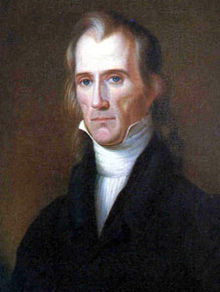Hugh Lawson White
Hugh Lawson White (born October 30, 1773 in Iredell County , North Carolina province , † April 10, 1840 in Knoxville , Tennessee ) was an American politician . He was the Representative of Tennessee in the United States Senate from 1825 until his resignation in 1840 . He was also a United States Whig Party candidate for presidency in 1836.
Life
White had fought in Tennessee in the years 1792-1793 in the war against Indian peoples. He then studied in Philadelphia and Lancaster , where he received a law degree. He began practicing as a lawyer in Knoxville in 1796. In 1801 he was appointed a judge, between 1808 and 1809 he was a federal attorney for the eastern district of Tennessee. He served in the Tennessee Senate from 1807 to 1809 and again from 1817 to 1825 . From 1809 to 1815 he was a member of the Tennessee Supreme Court . He later also worked as a banker and from 1812 to 1827 President of the Bank of Tennessee. In 1825 he was elected to the United States Senate for the Democratic Republican Party (Jacksonians) and confirmed in his mandate in 1829. In 1835 he was re-elected to the Senate for the Democratic Party , for a time he was Vice President of the Senate . From 1829-1830, as a senator, he wrote the Indian Removal Act , a law under which the president could relocate the Indian tribes of the east to areas west of the Mississippi, which resulted in the path of tears . His independent nature and strict sincerity earned White the nickname "The Cato of the United States".
At first he was a strong supporter of President Jackson . Their relationship fell apart after the Tennessee Legislature proposed White as a presidential candidate in 1835. He was one of a total of four candidates for the Whig Party, which was only founded in 1833 and was still poorly organized, which at that time was held together almost exclusively by the opposition to Jackson. In the elections in 1836, he won more than 146,000 votes and was able to get behind Tennessee, where he scored a landslide victory, and Georgia . Jacksons of former Vice Martin Van Buren of the Democratic Party was the election against the splintered opposition Whig decide for themselves but easy.
Senator White resigned on January 13, 1840. The Tennessee Parliament asked him to vote for a finance bill that, based on his own experience as a banker, he felt was fundamentally wrong. Alexander O. Anderson replaced him in the Senate on February 26, 1840. White died a few weeks after his resignation.
The White County , Arkansas, he was named in honor.
Web links
- Hugh Lawson White in the Biographical Directory of the United States Congress (English)
- Hugh Lawson White in the database of Find a Grave (English)
- Hugh Lawson White at the Tennessee Encyclopedia of History and Culture (English)
- A memoir of Hugh Lawson White judge of the Supreme Court of Tennessee, member of the Senate of the United States, etc., etc by Nancy Scott (1856) in the American Library at archive.org (English)
| personal data | |
|---|---|
| SURNAME | White, Hugh Lawson |
| BRIEF DESCRIPTION | American politician (Whig Party) |
| DATE OF BIRTH | October 30, 1773 |
| PLACE OF BIRTH | Iredell County , North Carolina Province |
| DATE OF DEATH | April 10, 1840 |
| Place of death | Knoxville , Tennessee |


